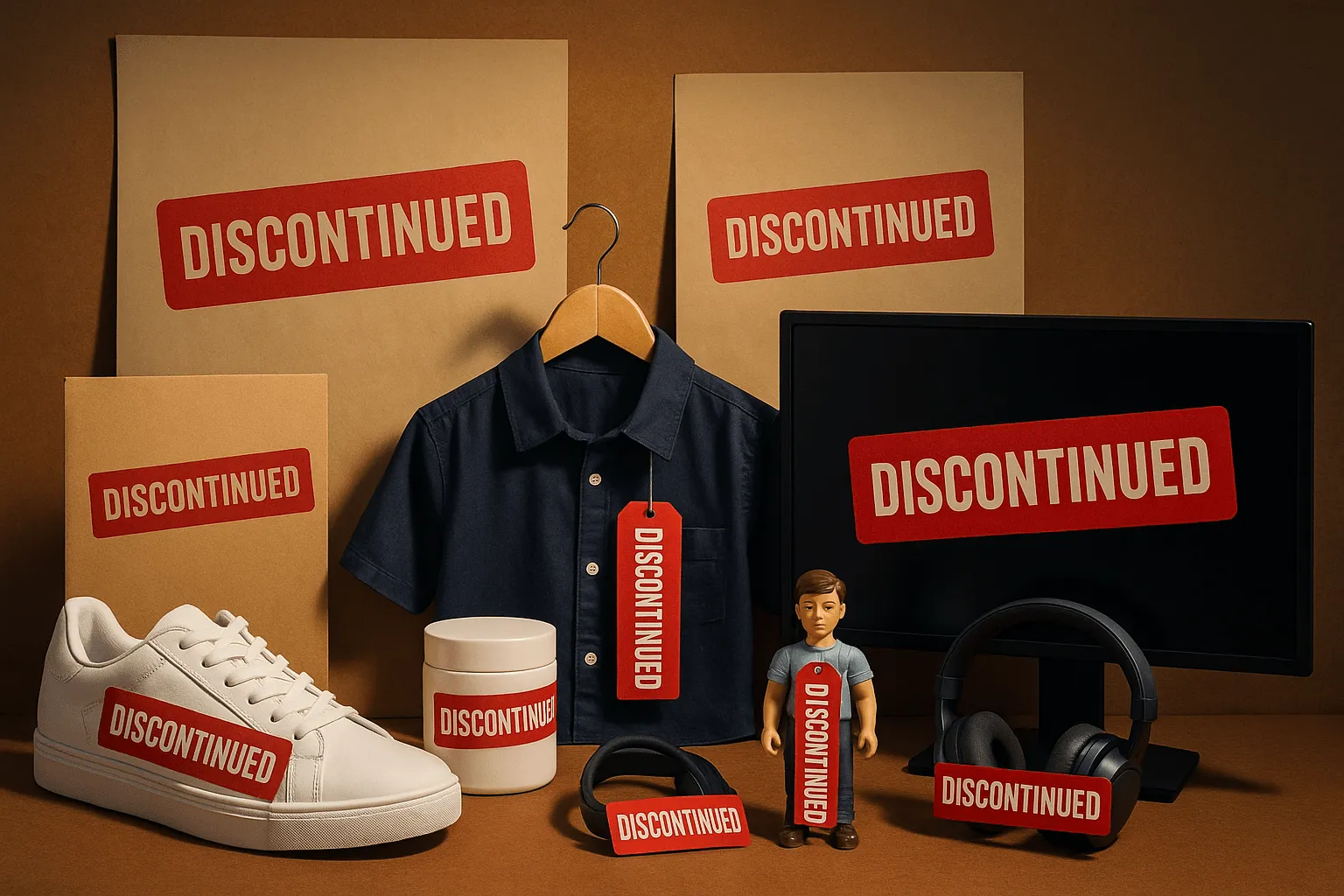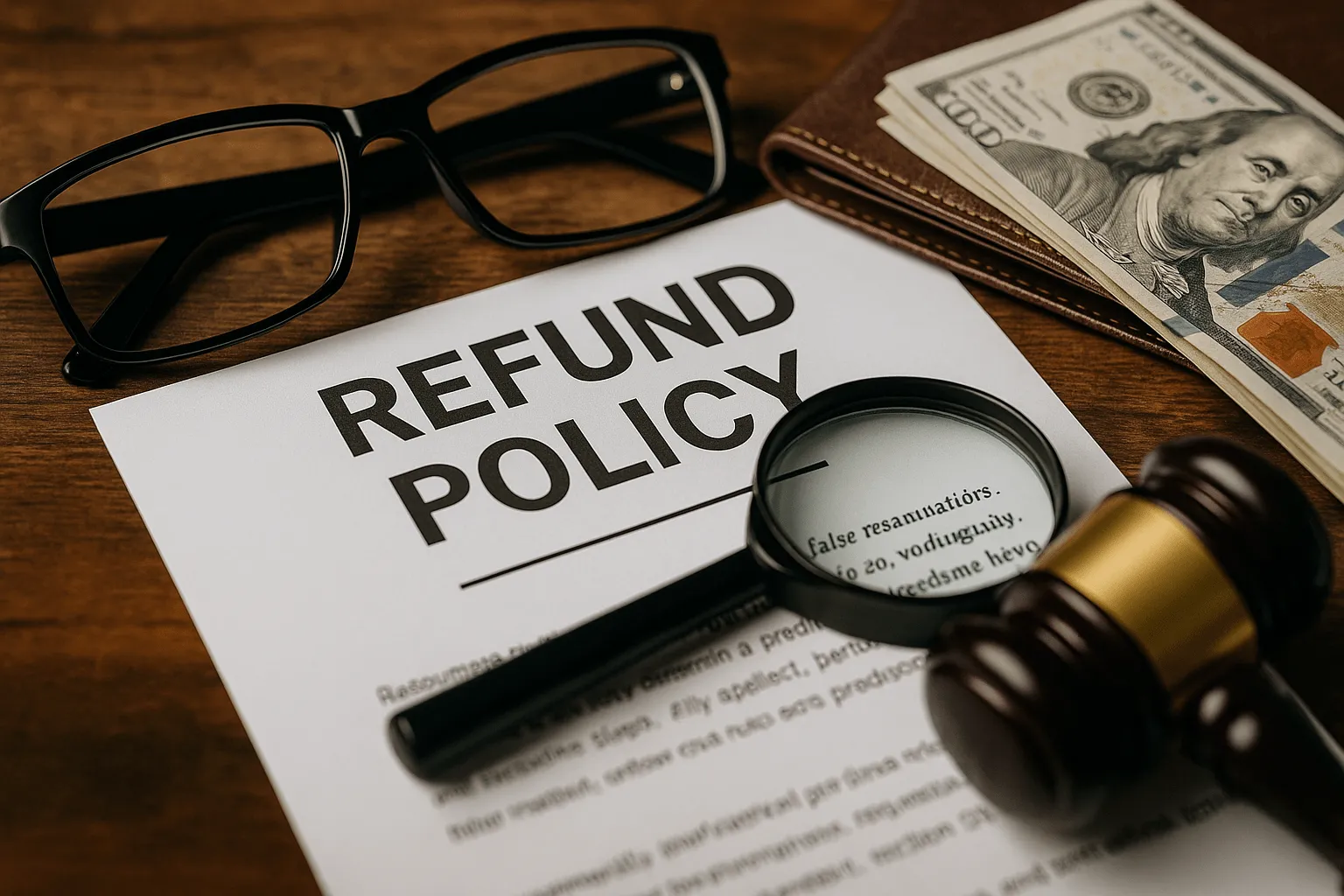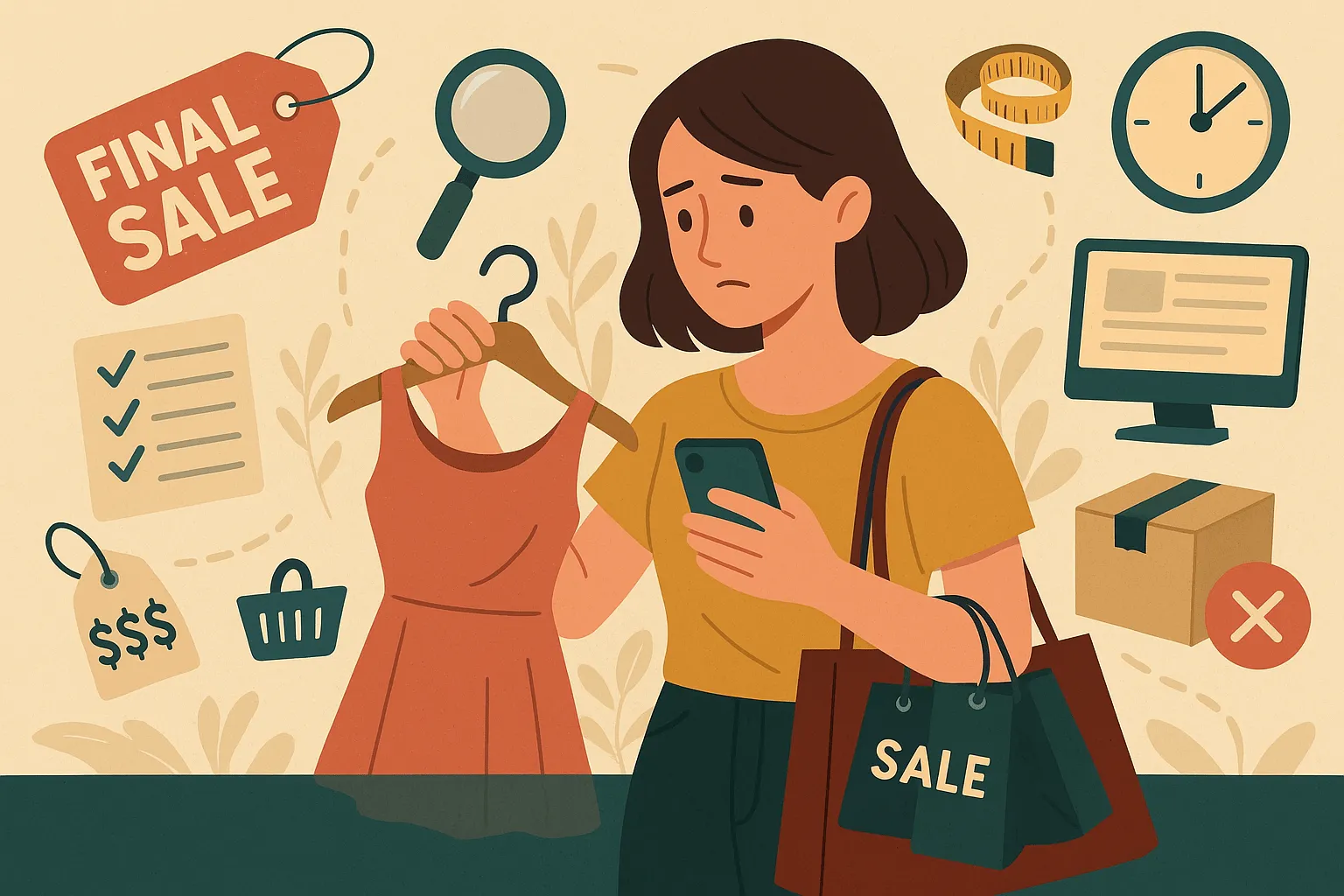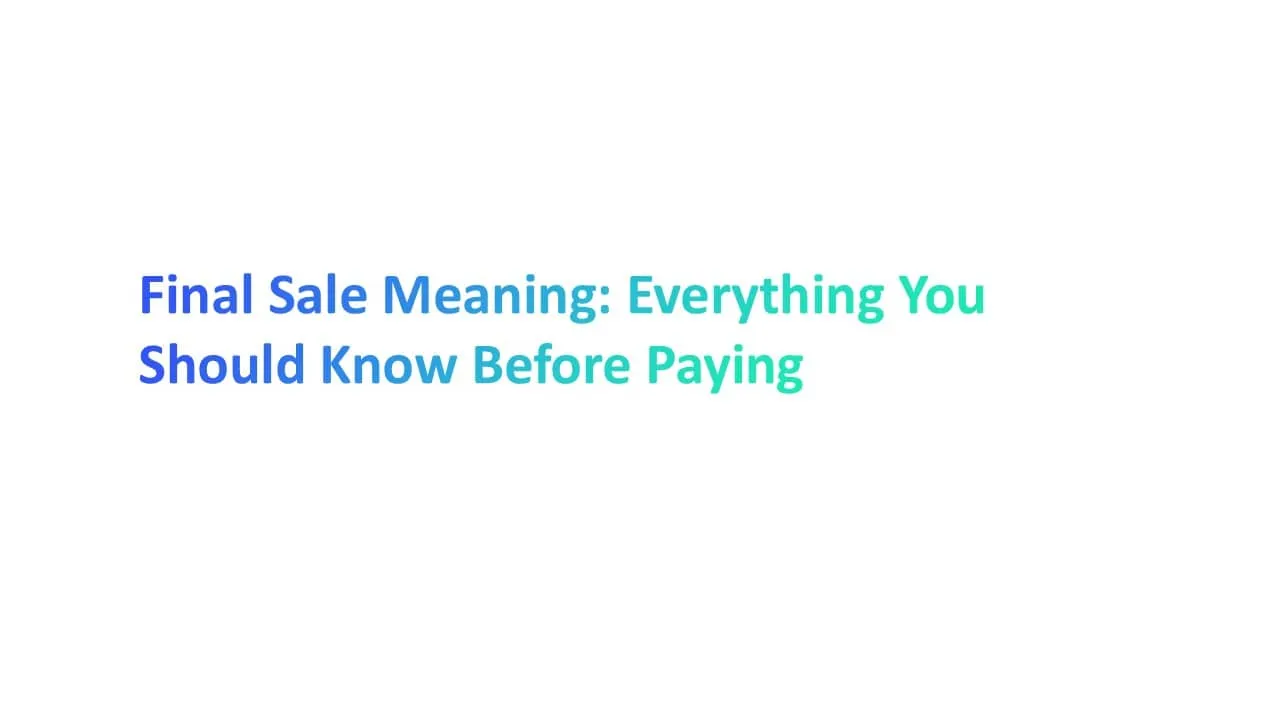Ever seen a “Final Sale” tag and thought, Wow, what a steal!—only to regret it later? You’re not alone.
According to the National Retail Federation, over 16% of U.S. retail purchases in 2023 were returned—but with final sale items, that door is usually shut. No returns, no exchanges, no “oops, I changed my mind.”
This guide breaks down exactly what the final sale meaning is, how it differs from clearance sales, and what policies retailers and online stores expect you to follow. This guide aims to provide helpful insights. By the end, you’ll know how to score great deals without falling into the “can’t return it” trap.
What is the Final Sale Meaning?

The final sale meaning is simple — once you buy it, it’s yours for good. Final sales usually mean no returns, no exchanges, and no refunds, unless the product is faulty or misrepresented.
According to the Federal Trade Commission, businesses must still honor refund policy rules for defective goods, even on final sale items, as mandated by law. You’ll often see this label on clearance sales, discontinued products, or seasonal stock.
How Final Sales differ from other types of Sales, like Clearance Sales or Retail Sales

Not every discounted item is a final sale item; there are a few categories that are exceptions. The difference lies in the return and exchange policy:
- Clearance Sales – Meant to clear old stock; many stores still accept returns.
- Retail Sales – Regular promotions with standard refund policy in place.
- Final Sales – Strictest terms; once you buy, the purchase is final.
Always check the store’s final sale policy before buying so you don’t run into mixed feelings or hassle later.
Final Sale Policy: What Retailers and Sellers Expect

What retailers expect you to know before buying:
- Final sale means the purchase is permanent unless the product is faulty.
- Some stores or online stores may still help in rare cases.
- Read the policy before purchasing to avoid mixed feelings later.
How refund requests are handled for final sale purchases
Most refund requests for final sale purchases are denied unless the product is defective. This protects retailers from loss when selling deeply discounted sales items. However, laws in many regions require businesses to accept returns if the item is faulty, unsafe, or falsely advertised.
Typical refund handling process:
- Defective product? Retailer may offer a replacement or full refund.
- Wrong item shipped? Online stores usually resend the correct one at no cost.
- Change of mind? Not allowed under most final sale policy rules.
Final Sale Items: Examples and Categories

1. Clearance Items
Clearance items are products a store is trying to move out to make space for new stock. This can include clothing, shoes, electronics, or brand merchandise from previous collections.
Why they are often final sale:
- They are already sold at the lowest price, sometimes below cost.
- Retailers want to avoid handling returns on deeply discounted sales.
- The items may be marked as last-available sizes, colors, or styles.
Example: If a store has clearance sales on last season’s brands, they may label them as final sale purchases so customers know they can’t accept returns.
2. Seasonal Merchandise
Seasonal merchandise refers to products tied to a specific season, event, or holiday—like winter jackets, Christmas décor, or summer swimsuits.
Why they are often final sale:
- Demand drops sharply after the season ends.
- Retailers and sellers want to clear inventory quickly before the next season.
- Returning out-of-season stock is often a hassle for stores.
Example: After Christmas, retailers may have sales on leftover holiday décor. They might list them in shopping final sales with a “no return” note in the website footer.
3. Discontinued Products

Discontinued products are items that a retailer or brand no longer makes or sells. Once the last stock is gone, there’s no way to replace it. Because of this, retailers often list these under final sales.
Why discontinued products are usually final sale:
- They may be old models, older brands, or products that have been replaced by new versions.
- Retailers want to sell them quickly and avoid the hassle of returns.
- Replacement parts or exact matches may not be available if you return the item purchased.
Example: A shoe store stops producing a certain clothing or shoes style and marks the remaining pairs as clearance items. They are sold under the final sale meaning because they can’t be replaced.
4. Personalized or Custom Orders
Personalized or custom orders are products made specifically for one customer. These can include engraved jewelry, monogrammed merchandise, or tailored clothing.
Why personalized items are final sale purchases:
- They can’t be resold to other buyers or customers.
- Custom work takes time, labor, and special materials, making refunds costly for the business.
- Once production starts, most retailers enforce the final sale policy.
Example: Ordering a jacket online with your name embroidered on it. Even if the price was high, the refund policy will not allow you to return it unless there is a production defect.
5. Hygiene and Personal Care Products
Items like makeup, skincare, body lotions, razors, and undergarments often appear in final sales. These are marked as non-returnable due to health and safety reasons.
Why they are almost always final sale purchases:
- Once opened, they can’t be resold for hygiene reasons.
- Many retailers follow strict regulations on health-related merchandise.
- The refund policy only applies if the item purchased arrives damaged or is the wrong product.
Example: If you buy mascara during a clearance sale at 70% off, it’s probably marked as final sale. Even if you dislike the color, the store won’t accept returns.
Quick tips before buying:
- Check expiry dates in the fine print.
- Make sure the packaging is sealed before purchase.
- Only buy shades, scents, or sizes you know you like to avoid mixed feelings.
6. Special Promotional Deals

Sometimes final sales include limited-time discounts, bundled offers, or “buy one, get one free” promotions. These are meant to sell quickly and usually have no full refund option.
Why these deals are final sale:
- They are offered for a short time to boost sales.
- Bundled or heavily discounted items cost more to process in returns than they earn.
- Retailers may state in the website footer or ad terms that these are final sale items.
Example: A “buy two perfumes, get one free” promotion. If you try to return one bottle, the refund requests will likely be denied because it breaks the deal conditions.
Before buying special deals:
- Read the refund policy and return rules before payment.
- Ensure you really want everything in the bundle before purchasing.
- Check product reviews if shopping online to avoid disappointment.
7. Final Sale Items from Online Stores
When buying final sale items from online stores, the rules are often even stricter than in physical stores. Once you click “buy,” most retailers will not accept returns or process refund requests unless the item purchased is damaged or incorrect.
Things to check before buying from online final sales:
- Read the product description carefully and look for size, color, and material details.
- Check customer reviews to avoid mixed feelings later.
- Confirm shipping costs and timelines—late deliveries can’t be refunded under most final sale policy rules.
- Screenshot the refund policy in case of disputes with sellers.
As consumer rights expert Lisa Brown says, “When shopping final sales online, your best protection is reading before clicking.”
The Fine Print: Understanding the Refund Policy

Before you buy, always check the refund policy. For final sale items, many retailers clearly state that they will not accept returns or give a full refund. This is part of the final sale meaning—once you purchase, it’s yours to keep.
Some stores do make exceptions. They may offer exchanges for defective merchandise or send replacements if the item purchased arrives damaged. But for most final sale purchases, your options are limited.
As the Federal Trade Commission (FTC) advises, “Read the store’s policy before paying. Don’t assume you can return or exchange a final sale item.”
Key points to remember:
- Check the fine print before purchasing.
- Look for the refund policy in the website footer when shopping online.
- Ask the retailer if they allow refund requests for damaged goods.
- Keep your receipt to support any exchange requests.
Being informed helps you avoid mixed feelings after your purchase—and ensures you shop with confidence.
Can You Return or Exchange a Final Sale Item?
Most stores clearly state the final sale meaning—you cannot return or exchange the product once purchased. This rule applies to most final sale items, whether bought in physical stores or from online stores. Always check the final sale policy before paying.
Shopping Final Sales: Tips to Avoid Buyer’s Regret

- Inspect the Item Carefully: Check the merchandise for any damage, missing parts, or defects before paying. Final sale items are often sold “as is,” so retailers are not required to accept returns. If you’re shopping online, read product descriptions and reviews closely.
- Compare Prices Before Purchasing: Sometimes clearance items or retail sales outside of final sales offer better value. Use price comparison sites to make sure you’re getting the best deal. Remember, once you buy a final sale item, you likely can’t get a full refund if you find it cheaper elsewhere.
- Know Your Size and Fit: For clothing, shoes, or accessories, always confirm your size. Many final sale policies state that wrong-size purchases are not eligible for exchange requests or refund requests.
- Be Wary of Seasonal and Trend-Based Sales: Some shopping final sales happen at the end of a season or for short-lived trends. Ask yourself if you’ll still use the product next year. This avoids mixed feelings later.
- Factor in Shipping and Return Rules: Check the refund policy and shipping charges before you purchase. Many online stores add high shipping costs or restrict refunds on final sale purchases.
- Trust Reputable Brands and Retailers: Buy from brands and retailers with clear final sale policies. Check the website footer for terms and fine print. A transparent seller makes buyers feel safer.
- Buy What You Need, Not Just What’s Cheap: A low price can tempt you, but buying without a purpose wastes money. As the Federal Trade Commission notes, “Consumers should read the return policy before buying.” If it’s a final sale item, be sure you actually want it.
Pro Tip: Always pause before checking out during final sales. Ask, “Would I buy this at full price?” If the answer is no, skip it.
Final Sale Purchases in Online Stores vs. Physical Stores
Legal and Consumer Rights for Final Sale Purchases

- Final Sale Is Legal, But Must Follow Consumer Laws: The final sale meaning is that once you buy the product, you usually cannot return or exchange it. However, this does not mean a retailer can ignore consumer laws. In the U.S., Canada, and many countries, final sales must still follow local and federal rules.
- Right to Refund or Exchange if the Item Is Faulty: Even if the tag says "final sale item," you can still request a refund or exchange if it is faulty.
- For example, if the clothing is torn or electronics don’t work, you have the right to a full refund. This applies whether you shop in physical stores or online stores. The law protects you from defective merchandise, even during clearance sales.
- Misrepresentation and False Advertising Are Illegal: If sellers advertise final sale items with false claims, that’s illegal. For example, a store cannot mark an item as “genuine leather” if it’s not.
Misleading customers can lead to refund requests, legal action, and penalties for the business. - Online Purchase Protections: Buying final sale items online gives you extra rights in some regions.
Certain countries allow a cooling-off period for online purchases, meaning you can return an item within a set time. Always check the refund policy before purchasing. - Retailer Must Comply with Local Laws: No matter the store or brand, the retailer must follow consumer laws. This means they must accept returns or issue refunds when the item purchased is damaged, unsafe, or misrepresented.
How to Enforce Your Rights
- Keep proof: Save receipts, emails, and photos of the defect.
- Know the law: Check your country’s consumer protection websites.
- Act fast: File refund requests or exchange requests quickly.
- Quote the rule: Point to the fine print or legal requirement in your area.
“Final sale policies cannot override your basic consumer rights,” — U.S. Federal Trade Commission.
FAQs

1. Does final sale mean discontinued?
- Not always. The final sale meaning is that you cannot return, exchange, or get a refund once you buy the product.
- Some final sale items are discontinued, but others may still be in production. Retailers may just want to clear older stock to make room for new merchandise.
2. What's the difference between final sale and clearance?
- Clearance sales usually offer deep discounts on products that can still be returned or exchanged if the store’s refund policy allows.
- Final sale items, however, are sold “as-is” with no returns. Always read the fine print before buying so you don’t face mixed feelings later.
3. Can I use coupons or promotional codes on final sale items?
- Many retailers do not allow coupons on final sale purchases. Some online stores make exceptions during special shopping events.
- Check the final sale policy listed on the product page or in the website footer before you try using a code.
4. Does final sale mean the product won’t be restocked?
- Not necessarily. Some final sales happen for seasonal items like clothing or shoes, which may come back in a different style or color.
- Other times, the retailer stops selling that brand or style completely. If you love the item, it’s safer to purchase it before it’s gone.
5. Where should I look to find the “final sale” terms?
You can usually find them:
- In the fine print on the product page
- In the store’s refund policy
- At the bottom of the website footer
- On clearance items or promotional emails from online stores
Conclusion
Understanding the final sale meaning can save you from costly mistakes. A buyer should always check the fine print and the refund policy before making final sale purchases.
It's essential for buyers to be aware of these detail. Many retailers clearly mark final sale items in the store or on online stores. If you’re unsure, ask the retailer directly.
Remember, as consumer advocate Jane Doe says, “Knowing your rights is as important as knowing the deal for customers.” When in doubt, read the terms and confirm if you can accept returns or request exchanges. A little attention now can save you a lot later.





.png)



